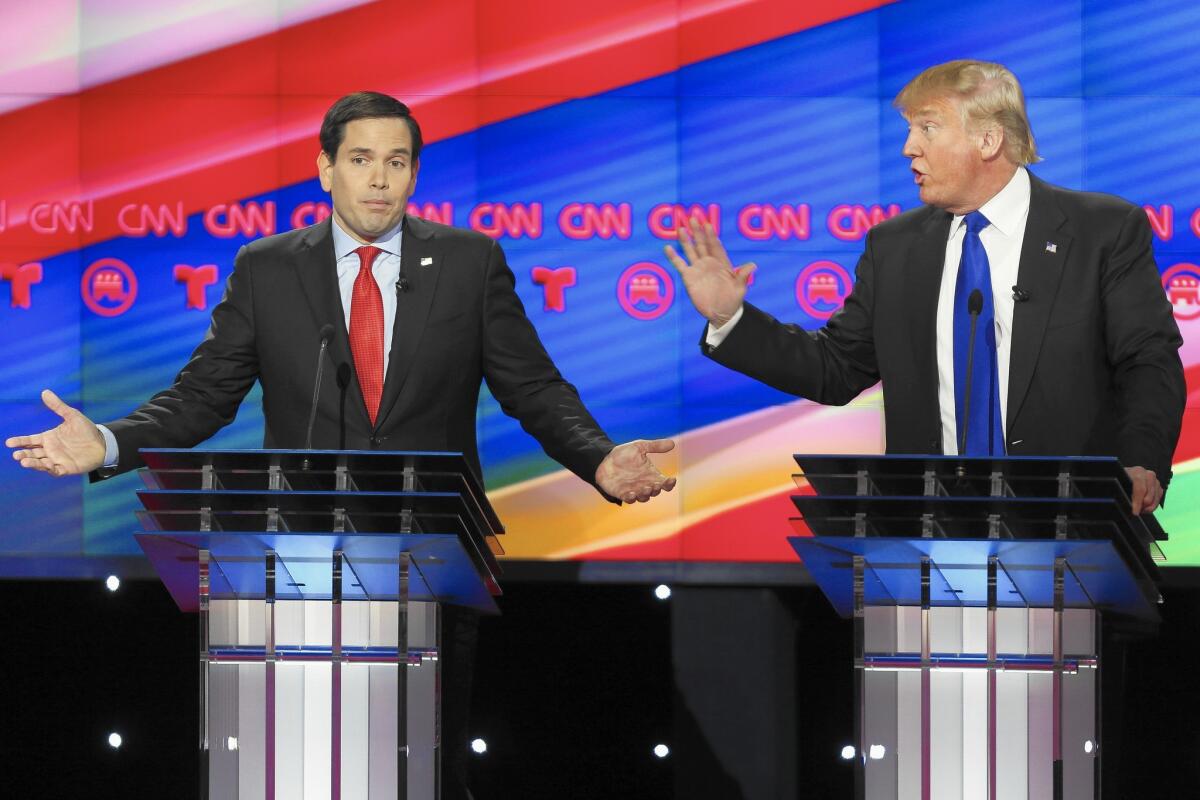Column:: It’s Marco Rubio’s turn to take Trump down

Presidential candidates Marco Rubio and Donald Trump argue while answering a question during the Republican debate held at the University of Houston on Thursday.
- Share via
If the people around Marco Rubio are right, the Republican presidential campaign is about to turn into a two-man race between Donald Trump and one remaining anti-Trump — the senator from Florida.
That’s why Rubio has abruptly launched a series of attacks on Trump — his business practices, his veracity and more. In strategy sessions last week, Rubio and his aides decided “that the arguments [against Trump] would break through now … and he could make it a two-man race,” one of his advisors told me.
At the debate, [Marco Rubio] claimed, Trump “asked for a full length mirror ... maybe to make sure his pants weren’t wet.”
The resulting shouting match reveals how thoroughly Trump’s style — heavy on personal insults, but light on, you know, policy — has transformed the entire GOP campaign. When Trump is in the ring, nobody can avoid mud wrestling.
Thursday’s high-decibel debate in Houston was only the opening salvo. Rubio continued the attacks on Friday, repeatedly labeling Trump “a con artist.”
“A tough guy?” Rubio scoffed at a rally in Dallas. “This guy inherited $200 million. He’s never faced any struggle.”
At the debate, he claimed, Trump “asked for a full length mirror … maybe to make sure his pants weren’t wet.”
That wasn’t exactly the kind of discourse the founding fathers had in mind in 1787. Maybe they had the right idea when they gave state legislatures the power to elect the president instead of the public.
Yet Rubio’s attacks were strategic. After watching other candidates fail to stop Trump by questioning his policies, Rubio concluded that the only way to win is by attacking the core of Trump’s appeal: his authenticity as a champion of the angry white working class.
“Don’t shoot down the airplanes, blow up the aircraft carrier,” Stuart Stevens, Mitt Romney’s chief strategist in 2012, argued. “A campaign that beats Trump will have to prove that the core of his message and the messenger both are fakes.”
There’s an irony in Rubio’s sudden turn to negative campaigning. When he launched his candidacy, it was supposed to be about optimism (he proclaimed a “new American century”) and his next-generation conservatism (he claimed to represent “the children of Reagan”).
In keeping with Ronald Reagan’s commandment never to criticize a fellow Republican, he not only avoided tangling with Trump; he even praised the billionaire for his proposal to ban all Muslims from entering the United States.
But Rubio is nothing if not agile. He’s been alternately admired and criticized as an ambitious political natural since his first run for the Florida legislature in 2000.
Elected to the Senate in 2010 as a tea party challenger to the GOP establishment, he began thinking about running for president almost immediately — almost like Barack Obama, who also ran for the White House in his first term.
He’s a genuine conservative who supports sweeping tax cuts, opposes abortion (including in cases of rape or incest), is skeptical on climate change and is a thoroughgoing hawk on foreign policy. Conservative scorecards rank him to the right of most of his Senate colleagues.
But Rubio isn’t an insurgent like Ted Cruz; he wants to work inside the system, not blow it up. He’s a dealmaker.
That interest in bipartisan bargaining led Rubio into his boldest — and, in retrospect, most painful — legislative venture, the 2013 bipartisan immigration bill.
Rubio helped write the bill, which included a path to citizenship for undocumented immigrants. That turned out to be wildly unpopular among most Republican voters.
He now says he wouldn’t even try to change immigration laws until the border is fully secure, but polls suggest he’s still distrusted by many in his party who rank the issue high on their list of concerns.
So instead of trying to convert primary voters on the issues, Rubio hopes to peel some of them away from Trump by painting the mogul as a “con artist” who hired undocumented immigrants to work on construction projects.
Even then, Rubio could be too late to stop Trump. He hasn’t won a primary yet, and Rubio aides already concede that they are unlikely to win any on Super Tuesday; they’re pinning their hopes on his delegate-rich home state of Florida, which votes in a winner-take-all primary on March 15. But Trump leads the polls there as well.
If Rubio fails to take Trump down, he has one consolation: He’s only 44. He’ll be well-positioned to run again the next time the job opens up.
Twitter: @doylemcmanus
Follow the Opinion section on Twitter @latimesopinion and Facebook
More to Read
A cure for the common opinion
Get thought-provoking perspectives with our weekly newsletter.
You may occasionally receive promotional content from the Los Angeles Times.










